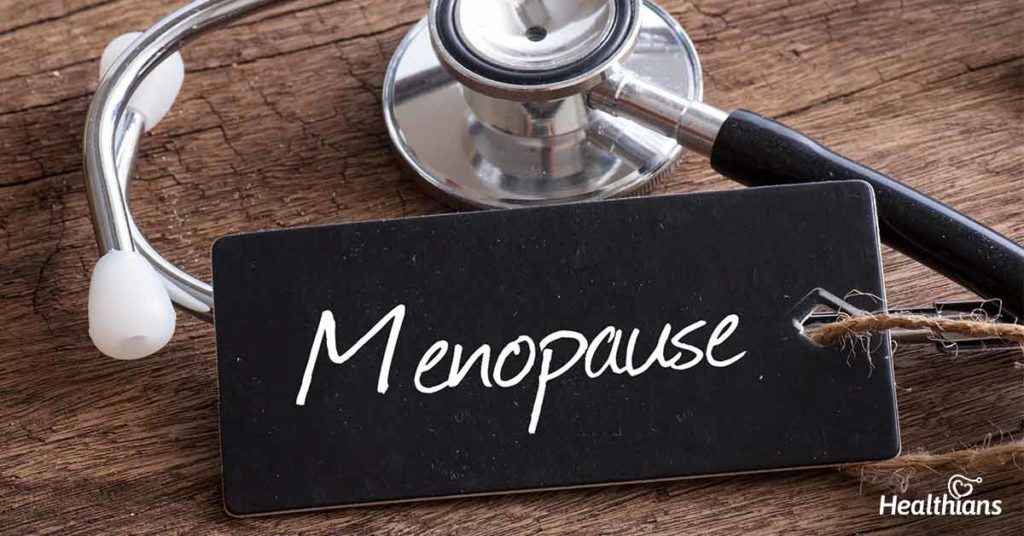Introduction
Every woman has to experience menopause at some point in her life. Menstrual periods come to a stop with menopause. After a woman has gone 12 months without a menstrual cycle, she is said to have undergone menopause.
Women go through a major transformation throughout menopause. It could feel like a huge relief that periods are no longer coming to you every month. However, the adjustment is not always easy for all women. Your body undergoes a number of changes throughout menopause.
These modifications might be mental, emotional, or physical. A healthy diet and lifestyle will make the transition to menopause simpler and lessen any issues that may arise during this time.

What is menopause?
Menopause occurs in a woman’s body naturally and biologically. Your periods will end at this time, and your reproductive system will be inactive.
Women between the age of 40 to 50 often experience menopause. In India, a woman typically reaches menopause at the age of 46.
After a year without menses or periods, a woman is considered to be at the stage of menopause. Hormonal shifts cause havoc in your body throughout menopause. Your energy levels may be depleted by symptoms like night sweats, hot flashes, anxiety, and sleep disruption, which can also have an emotional impact. Here we have provided the best foods for menopause journey of every woman.
Hormone therapy and dietary modifications are two therapies that are usually recommended to women undergoing menopause.
Symptoms of menopause
There are various symptoms which women experience before menopause which differ from woman to woman.
These include
- Vaginal dryness
- Hot flashes
- Night sweats
- Chills
- Mood changes
- Slowed metabolism
- Weight gain
- Hair-thinning
- Dry skin
- Loss of breast fullness
- Disturbed sleep
- Urinary incontinence
6 best foods for the Menopause years
You can maintain good health by eating nutrient-dense, well-balanced meals. Additionally, it will aid in reducing those uncomfortable menopausal symptoms.
Keep in mind that there is no one diet or superfood that will relieve menopausal symptoms. It is recommended to stick to a diet plan that is tailored to your needs and body weight. You can create a simple menopausal diet with the help of a skilled nutritionist or dietitian.
The top six foods to consume during menopause are listed below. These foods are nutrient-dense and may be incorporated into your diet for the best outcomes.
Nuts
Magnesium, which is abundant in nuts and is particularly beneficial for reducing anxiety, sleeplessness, mood swings, and sadness. Magnesium is also regarded as an essential for bone strength.
Additionally, nuts are a great source of calcium, zinc, omega-3 fatty acids, protein, and other nutrients that help in treating menopausal symptoms.
We encourage you to keep your daily intake of nuts to no more than a handful because they are heavy in calories.
Broccoli
It helps in elevating oestrogen levels. It is rich in calcium, prevents osteoporosis and promotes bone density.
Bloating is a frequent menopausal symptom that broccoli also treats. Aim for at least 5 servings of broccoli every week.
You may add other cruciferous vegetables to your diet, such as cauliflower, cabbage, and baby cabbage.
Eggs
Women experiencing menopause generally have iron and vitamin D deficiency. You can include eggs in your menopausal diet as they are rich in iron, proteins and vitamin D. They also help lower the cholesterol levels in the blood and help prevent weight gain which is most common during menopause.
Turmeric
The bright yellow spice called turmeric, commonly referred to as ‘Indian saffron,’ is a wonder spice because of many factors.
The finest anti-inflammatory product in your kitchen is turmeric, which contains the active component curcumin.
It is already widely utilised in Indian cuisine. You can have ‘golden milk’ every night to utilise the most advantages of turmeric. Due to its anti-inflammatory characteristics, turmeric assists women in controlling various menopausal symptoms, such as hot flashes and joint pain. As a ‘warming spice’, turmeric is believed to increase blood flow, stimulate digestion, and improve nutrient absorption.
Whole grains
Vitamin B, minerals, nutrients, and fibre are all present in whole grains. They work wonders for balancing energy levels and enhancing metabolism. Whole grains are important for the nervous system and mood, and fibre helps to keep you fit both mentally and physically. Research also shows that consuming whole grains instead of refined grains can lower your risk of cardiovascular diseases.
Green leafy vegetables
Calcium, which is essential for maintaining healthy bones and preventing osteoporosis, which is common after menopause, is abundant in green leafy vegetables. They are also abundant in antioxidants, which alleviate symptoms and decrease inflammation.
Include leafy vegetables in your regular cooking, such as spinach, kale, mustard greens, methi, etc.
Final thoughts
Menopause is not an illness but rather a stage of life. Consider it a fresh start to the next chapter of your life.
Aim for 8 glasses or more of water each day to stay hydrated. Avoid things that might increase symptoms like hot flashes and dehydration, such as coffee, spicy food, and alcohol.
Adopt a healthy lifestyle and keep your weight in check. Your daily routine should include regular walking. Joining an online fitness programme will allow you to work out from the comfort of your home with a trained fitness coach.
Your diet plan should include lots of fruits, vegetables, nuts, and foods high in fibre, iron, calcium, and other nutrients. You may choose the best foods for menopause, a good diet plan for you based on your body weight and nutritional needs. You may consult a qualified dietician for a personalised recommendation by clicking on the following link –




